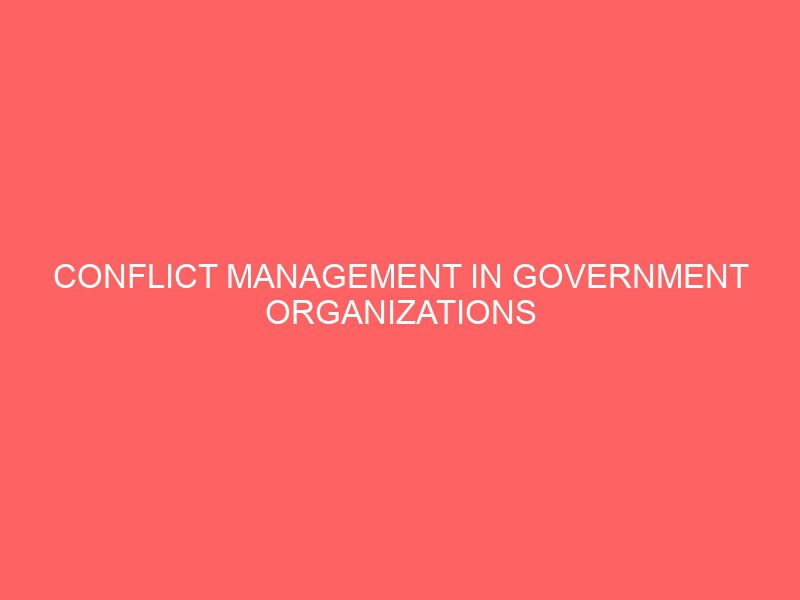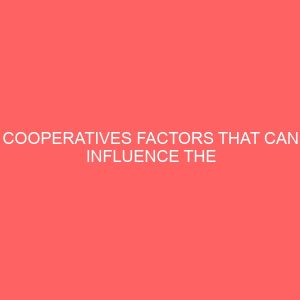Description
CHAPTER ONE
1.0 INTRODUCTION
1.1 BACKGROUND OF THE STUDY
This research is on Conflict management in government organizations (a case study of Enugu state housing development corporation (ESHDC). A government organization is a public enterprise run by human beings to achieve certain goals. A public enterprise is an organization created, partly or wholly owned and largely controlled by public authority (government) and which is supposed or expected to operate along industrial, commercial or profit making lines.
Though engaged in commercial activities, they have social responsibilities. For the fact that human being work in these organization in order to achieve the set goals, be it public or private, it is certain that conflict must arise from time to time due to individual and group differences. Conflicts of right and interest among others may be visible.
Feldman et al (1993) said that inter group conflict often result from two main factors viza viz coordination work between groups and organizational control systems. Okpara (1981) was of the opinions that conflict is an invisible outgrowth of functional interdependence and scarcity of resources in modern organizations.
Meanwhile due to the need for organizations in terms of rendering services to the citizenry job opportunities, security of tenure and patronage interalia, conflict resolutions strategies and techniques need very much to be improved in our organizations, particularly the Government owned, they provide goods and services at affordable cost for the well being of the general public, faster and accelerate social progress for economic growth political integration and national development.
1.2 STATEMENT OF THE PROBLEM
For the fact that human being comes together to put money, machine and materials together to achieve a goal, there are bound to be conflict. And the negative effect of conflict in modern organizations has necessitated this study partnership have split, churches have broken away some Government organizations closed down due to inability to manage conflict. Conflict on its own is not a taboo, it can be functional or dysfunctional what matters is how it is handled.
The negative effect of conflict in organization especially Government owned organization had prompted this study knowing that Government is the largest employer of labour in Nigeria as well as the provides of socio economic and political satisfaction for the citizenry.
Therefore, the Enugu State housing development corporation (ESHDC) which is an Enugu State Government owned organization was chosen as a case study.
1.3 OBJECTIVES OF STUDY
The main objective of this study is to examine the causes of conflicts in the Enugu State Housing Development Corporation (ESDHC). Other objectives arising from the main objective are the following:
- To ascertain how the corporation manages its conflict
- To ascertain in effects of conflict on the corporation
- To evaluate the corporations over all conflict management strategies with a view to making recommendations for improvement.
1.4 RESEARCH QUESTIONS
The study will be guided by the following questions:
- How do conflicts affect the effectiveness and efficiency of the Enugu State Housing Development Corporation?
- In what way does conflict manifest in the corporation?
- What types of conflict resolution strategies are adopted in the corporation?
- What types of conflict occur regularly in the corporation?
- How effective are the adopted strategies in resolving conflicts in the corporation?
1.5 SIGNIFICANCE OF THE STUDY
This study will help to reveal the following to the corporation:
- Types of conflict
- Sources of conflicts
- Strategies for resolving conflict that cannot be presented in modern organization
- The strategies adopted for reducing conflict
1.6 SCOPE OF THE STUDY
This research is interested in conflict management in Government organization but with particular focus on the Enugu State Development Corporation (ESHDC) as case study.
The paper will investigate conflict management in the corporation from 2000-2006 (7years) under Dr. Chimaraoke Ogbonnaya Nnaman’s Government
1.7 LIMITATION OF THE STUDY
A numbers of variables including socio-economic political, cultural, environmental and organizational factors are likely to impact on problem of application of conflict. However, time and resources will all only a limited exploration of these subjects.
Conclusion will also be limited to what can deduced from interviews and responses made by respondents and guided by the personal judgment represent the true situation.
Time and financial resources also posed a lot of limitations of this study.
1.8 DEFINITION OF MAJOR TERMS
Conflict: conflict is a serious differences of opinion, wishes etc.
Management: management is a group of people set or organized to discharge a particular work.
Government organization: Government organization is a public enterprises run by human being to achieve certain goals.
Patronage: patronage is the support and encouragement given by a patron.







Reviews
There are no reviews yet.